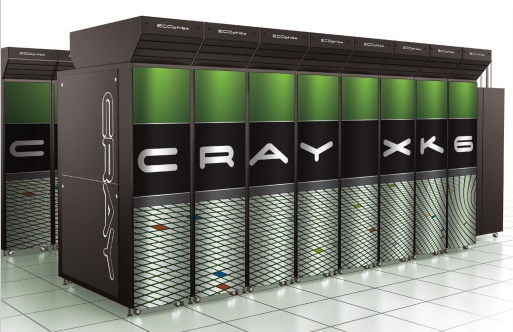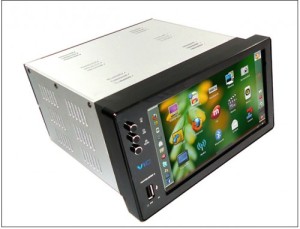Cray XK6 supercomputer smashes petaflop record, humbly calls itself a general-purpose machine and each blade includes up to four compute nodes containing AMD Opteron CPUs and Nvidia Tesla-architecture GPUs……..
Global supercomputing leader Cray Inc. announced the launch of the Company’s new production hybrid supercomputing system, the Cray XK6 supercomputer at the 2011 Cray User Group (CUG) meeting in Fairbanks, Alaska. The highly anticipated new supercomputer will combine Cray’s Gemini interconnect, AMD Opteron 6200 Series processors (code-named “Interlagos“) and NVIDIA Tesla 20-Series GPUs to create a tightly-integrated supercomputing system upgradeable to more than 50 petaflops (quadrillions of operations/second) of compute power. The Cray XK6 system introduces an innovative approach to increasing programmer productivity with a unified x86/GPU programming environment that includes tested and powerful tools, libraries, compilers and third-party software. When combined with the Cray Linux Environment, the result is a fully integrated Cray supercomputer that blends scalable hardware, software and a network. Cray XK6 customers will be able to utilize the capabilities of a multi-purpose supercomputer designed for the next-generation of many-core, high performance computing (HPC) applications.
The Swiss National Supercomputing Centre (CSCS) in Manno, Switzerland is Cray’s first customer for the new Cray XK6 system. CSCS, which develops and promotes technical and scientific services for the Swiss research community in the field of HPC, signed a contract with Cray to upgrade its Cray XE6m system, nicknamed “Piz Palu,” to a multi-cabinet Cray XK6 supercomputer. CSCS is a long-standing Cray customer and supports scientists working in diverse fields such as weather forecasting, climatology, chemistry, physics, material sciences, geology, biology, genetics, experimental medicine, astronomy, mathematics and computer sciences. Professor Dr. Thomas Schulthess, Director of CSCS, said, “Given the remarkable interest in GPU technology from the Swiss computational science community, it is essential that CSCS adopt this technology into its high-end production systems soon. However, we are not looking for another GPU based stunt to place high on any Top500 lists. The Cray XK6 promises to be the first general-purpose supercomputer based on GPU technology, and we are very much looking forward to exploring its performance and productivity on real applications relevant to our scientists.”
A powerful addition to Cray‘s line of highly-advanced supercomputers, the Cray XK6 system pairs industry-leading HPC technologies from AMD and NVIDIA to create a true hybrid supercomputer with intra-node flexibility. By combining AMD Opteron processors with NVIDIA GPUs, the compute node in the Cray XK6 system gives users the option to run applications with either scalar or accelerator components. The Cray XK6 compute blades can also be blended with Cray XE6 compute blades into a single, multi-purpose supercomputing system. “Every aspect of the Cray XK6 has been engineered to meet the real-world performance demands of researchers and scientists tasked with solving the world’s grand challenges,” said Barry Bolding, vice president of Cray’s product division. “Cray has a long history of working with accelerators in our vector technologies. We are leveraging this expertise to create a scalable hybrid supercomputer — and the associated first-generation of a unified x86/GPU programming environment — that will allow the system to more productively meet the scientific challenges of today and tomorrow. We built the world’s first production petaflops system with the Cray XT5 supercomputer, reinvented high performance networking with the Gemini interconnect, and we are now redefining accelerator-based supercomputing with the unified GPU and scalar technologies built into the Cray XK6 system.”
Upgradeable from Cray XT4, Cray XT5, Cray XT6 or Cray XE6 systems, the Cray XK6 system is expected to be available in the second half of 2011. It can be configured in a single cabinet with tens of compute nodes, to a multi-cabinet system with tens of thousands of compute nodes. “GPUs are playing an increasingly important role in high performance computing as researchers and scientists look to augment the CPU performance on certain codes,” said Earl Joseph, IDC program vice president for HPC. “Cray is a leader in the high-end of the supercomputing market and has designed, built and installed some of the world’s most powerful systems. The company has decades of experience in successfully integrating hybrid processor types into large scale systems. This strategy of hybrid supercomputing is extremely valuable, and Cray is in a good position to take advantage of it.”
[ttjad keyword=”desktop-computer”]




Holy crap! Anyone see this video?!?!?
http://bit.ly/j6gB8m